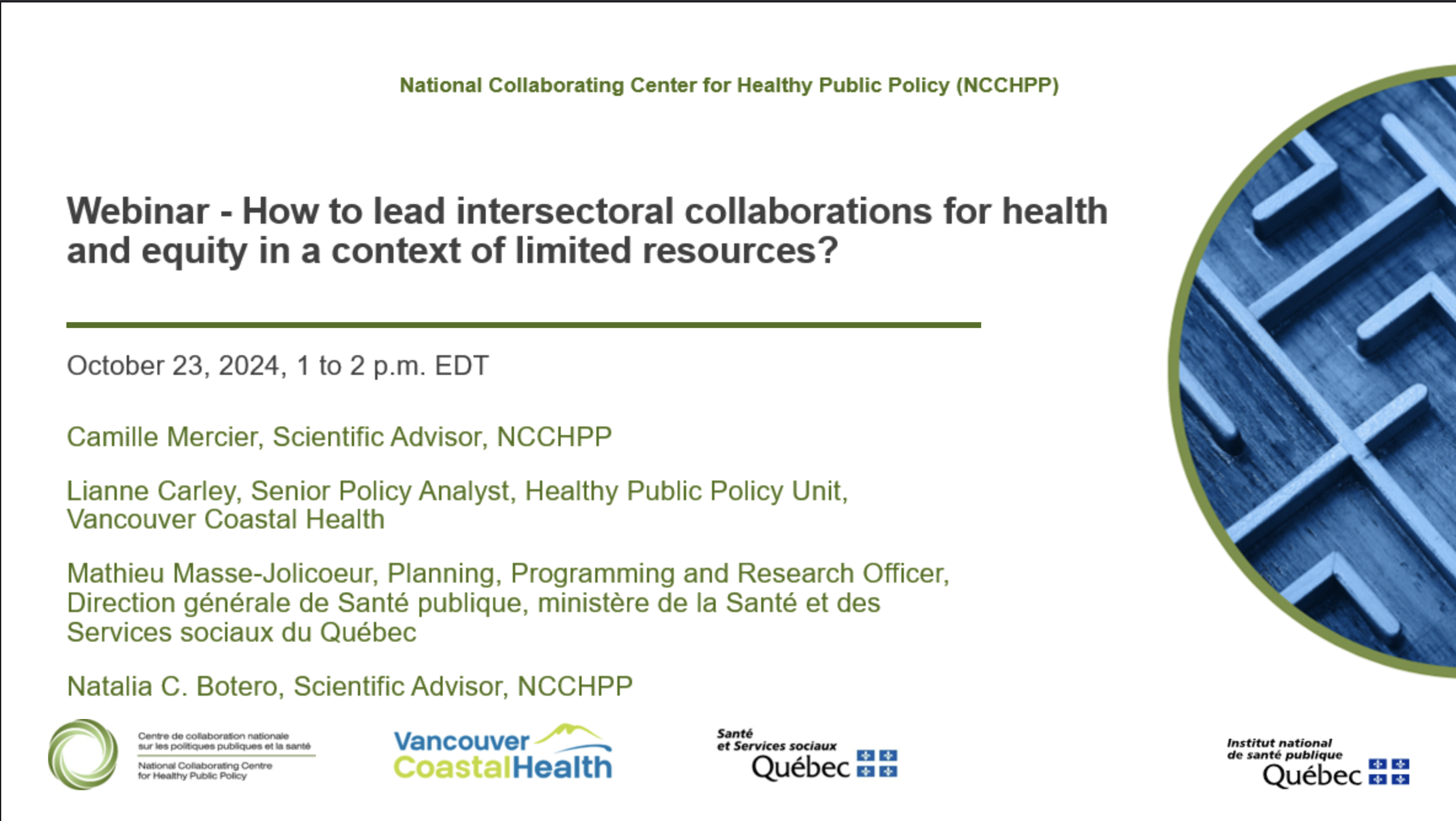The importance of collaboration between different sectors in fulfilling the missions of health prevention and promotion, as well as in solving complex, multifactorial problems, is widely recognized in the field of public health. While intersectoral collaborations already involve well-known challenges, lack of resources is a reality that public health and its allied sectors are also often confronted with. In this case, how do you go about establishing or maintaining intersectoral partnerships in a context of limited resources?
The presentations in this webinar were based on the results of a review of the literature on the challenges, opportunities, and strategies associated with intersectoral action in the context of budgetary constraints. Following this, two presentations—one by a member of the Healthy Public Policy Unit at Vancouver Coastal Health, and another by a professional from the Direction générale de santé publique at Québec’s ministère de la Santé et des Services sociaux—shared their insights on the topic of intersectoral collaboration in a context of resource constraints, as well as some practical strategies to be prioritized in such a context. This webinar was held on October 23, 2024.
TARGET AUDIENCES
This webinar was intended for public health professionals and administrators whose field of action requires collaboration with other sectors, and for their partners.
LEARNING OBJECTIVES
By the end of the webinar, participants were able to describe:
- the challenges of intersectoral collaboration in a context of limited resources;
- and the opportunities and strategies associated with this type of initiative in such a context.
SPEAKERS
 Camille Mercier
Camille Mercier
Scientific Advisor
National Collaborating Centre for Healthy Public Policy
Camille holds a bachelor’s degree in applied public policy and a master’s degree in international and public policy from the Université de Sherbrooke. Before joining the Centre, she worked at the Public Health Agency of Canada on the implementation of COVID-19 border control measures and completed an internship at the CIUSSS de l’Estrie with the public health surveillance team. At the NCCHPP, she works on the Health in All Policies project by exploring the effects of budgetary restrictions on public health governance and particularly on intersectoral governance.
 Lianne Carley
Lianne Carley
Senior Policy Analyst
Healthy Public Policy Unit, Vancouver Coastal Health
Lianne Carley is a Senior Policy Lead for the Healthy Public Policy Unit at Vancouver Coastal Health. Lianne has been working for the health authority for over 20 years, previously in community development and in population health. Lianne has worked both locally and globally in a variety of topic areas from refugee settlement to youth development to elephant conservation. While the issues may be different, the common thread is the need to work across sectors in complementary and collaborative ways to achieve a mutually beneficial end.
 Mathieu Masse Jolicoeur
Mathieu Masse Jolicoeur
Planning, Programming and Research Officer
Direction générale de santé publique, ministère de la Santé et des Services sociaux du Québec
Mathieu Masse Jolicoeur holds a master’s degree in political science from UQAM where he also completed political science doctoral studies. He has worked in program evaluation, knowledge transfer and public policy as a research officer, project manager and project director. In this capacity, he was involved in several large-scale projects involving multiple partners. For the past ten years, he has been involved in public health at the Direction régionale de santé publique de Montréal. He is currently working with the Direction Générale de santé publique of the ministère de la Santé et des Services sociaux du Québec. He also teaches at several universities, including at UQAM’s political science department, the ÉNAP and the Université de Montréal’s faculty of medicine.



